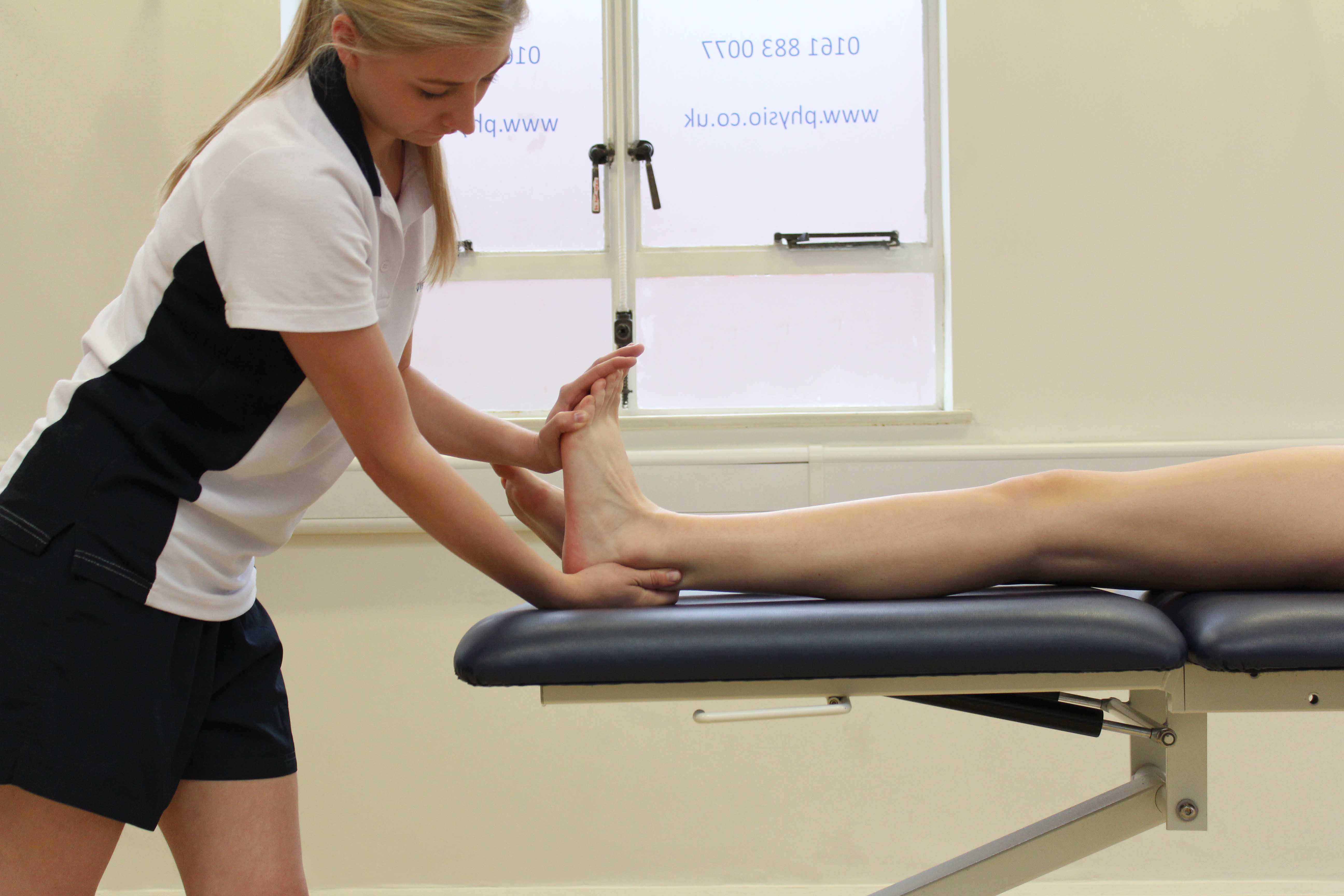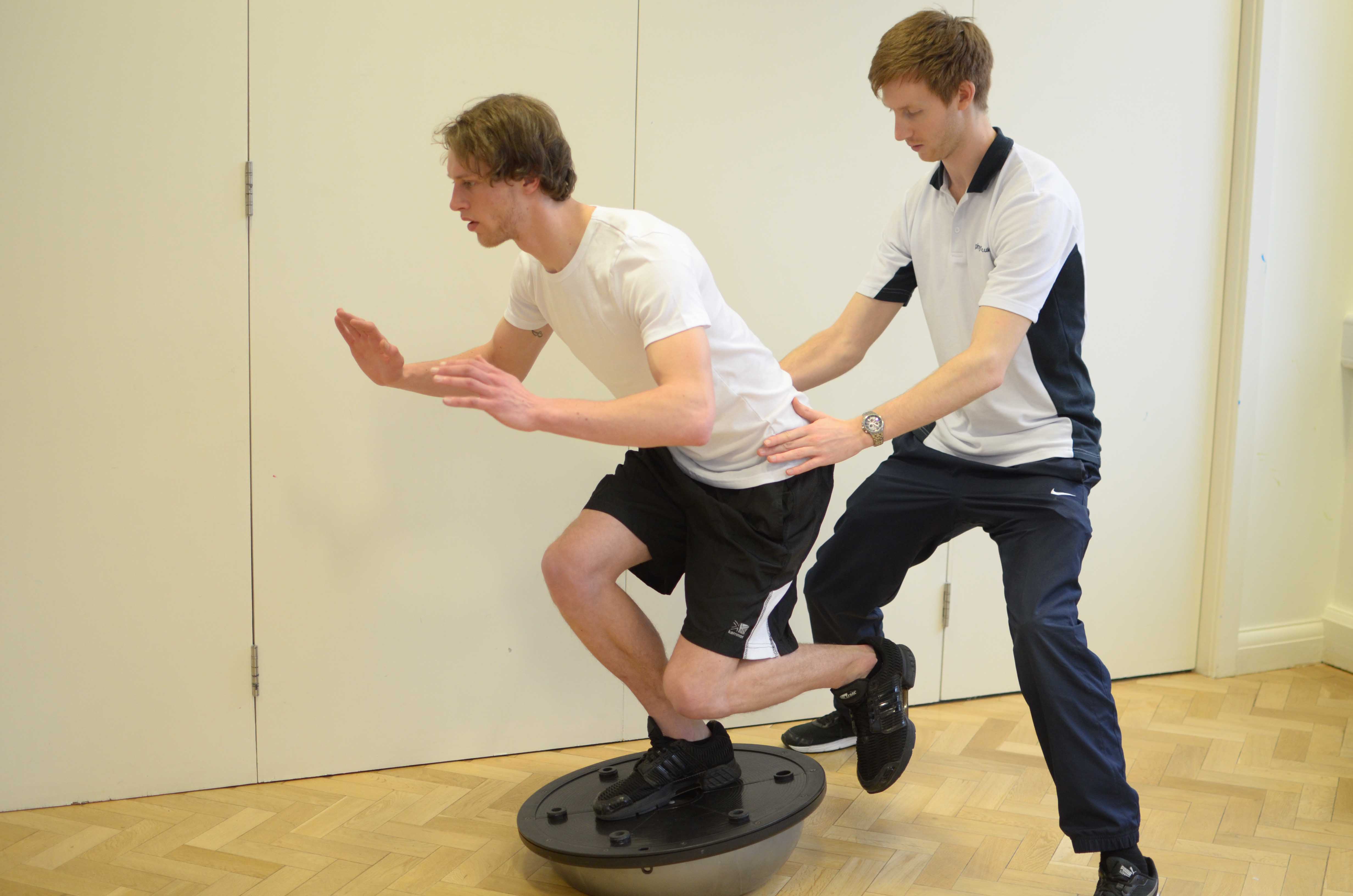What is an inferior tibiofibular joint injury?
The inferior tibiofibular joint is the joint between the shin bone (tibia) and the smaller lower leg bone (fibula) where they meet just above the ankle joint. An inferior tibiofibular joint injury is caused when this joint and its supporting structures are damaged. Physiotherapy is an effective treatment for inferior tibiofibular joint injury.
How does an inferior tibiofibular joint injury happen?
An injury to the inferior tibiofibular joint occurs if the leg is rotated or twisted in relation to the foot. This mechanism can occur when pivoting or quickly changing direction whilst sprinting.
 Above: Passive stretch of the achilles tendon performed by specialist therapist
Above: Passive stretch of the achilles tendon performed by specialist therapistWhat are the symptoms of an inferior tibiofibular joint injury?
An inferior tibiofibular joint injury causes pain just above and at the front of the ankle joint. This is pain is usually aggravated by activities which require rotation of the leg. Other symptoms may include:
What should I do if I have an inferior tibiofibular joint injury?
You can speed up your recovery by following the simple RICE regime over the first 24–48 hours. Swelling is necessary for the injury to heal; however, too much swelling can delay healing. The RICE regime (Rest, Ice, Compression, and Elevation) reduces blood flow to the injured area and, therefore, can reduce swelling. Rest involves limiting the amount of weight you put through your leg. The use of crutches may be required if you are having difficulty walking. Ice should be applied to the ankle for 15–20 minutes every 1–2 hours. It should be applied using a bag of frozen peas or crushed ice wrapped in a damp cloth. Compression involves the application of an elastic bandage around the ankle. It should be firm but not tight. Elevation involves lying with your ankle resting on a chair or pillows so that it is above the level of your heart. You should continue the RICE regime until you have been assessed by a physiotherapist. This should ideally be within the first 48 hours of the injury.
What shouldn’t I do if I have an inferior tibiofibular joint injury?
Following an injury to the inferior tibiofibular joint, you should not undertake activities which increase blood flow and, therefore bleeding and swelling in the injured area. These include hot showers, heat rubs, the consumption of alcohol and excessive activity.
 Above: Stability training for the foot and ankle supervised by an experienced physiotherapist
Above: Stability training for the foot and ankle supervised by an experienced physiotherapistPhysiotherapy treatment following an inferior tibiofibular joint injury.
Physiotherapy is important in the treatment of an inferior tibiofibular joint injury. Initially, your physiotherapist can diagnose your injury and the severity of the injury. Following the initial assessment, your physiotherapist will be able to devise an appropriate treatment plan. In the majority of cases, treatment involves:
Could there be any long-term effects from an inferior tibiofibular joint injury?
If properly diagnosed and treated injuries to the inferior tibiofibular joint usually get better in a number of weeks and do not cause any long-term effects. Some injuries may require surgery to stabilise the joint. If this stabilisation surgery is not performed in a severe inferior tibiofibular joint injury, arthritis of the ankle joint may develop due to excessive wear and tear within the joint.
To arrange a physiotherapy assessment call Physio.co.uk on 0330 088 7800 or book online.

 0330 088 7800
0330 088 7800





































